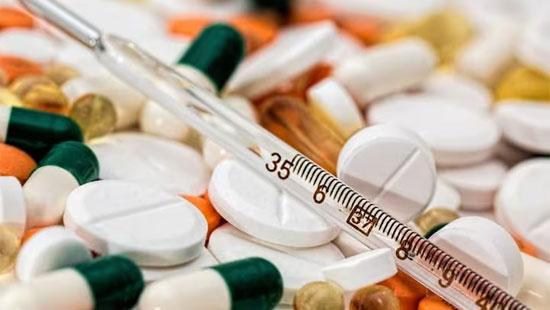Reply To:
Name - Reply Comment
Last Updated : 2024-05-28 01:26:00
 In the realm of global healthcare, the reputation of India's pharmaceutical industry stands as a beacon of innovation and affordability. Yet, lurking beneath the surface lies a sinister plot aimed at tarnishing this vital sector. Recent headlines have cast doubt on the quality and safety of Indian medications, sparking concerns and shaking confidence in a cornerstone of healthcare worldwide. But are these accusations founded on truth, or are they part of a carefully crafted narrative designed to discredit Indian pharma? In this exposé, we peel back the layers of misinformation to reveal the true motivations behind the shadowy campaign against Indian medicine.
In the realm of global healthcare, the reputation of India's pharmaceutical industry stands as a beacon of innovation and affordability. Yet, lurking beneath the surface lies a sinister plot aimed at tarnishing this vital sector. Recent headlines have cast doubt on the quality and safety of Indian medications, sparking concerns and shaking confidence in a cornerstone of healthcare worldwide. But are these accusations founded on truth, or are they part of a carefully crafted narrative designed to discredit Indian pharma? In this exposé, we peel back the layers of misinformation to reveal the true motivations behind the shadowy campaign against Indian medicine.
In December 2023, Livemint published a headline alleging that the US had recalled 'substandard' Indian medications, igniting concerns about the quality and safety of Indian pharmaceutical products. However, it was revealed that this negative portrayal of Indian pharma in the media was just one facet of a narrative that had been evolving for years.
In July 2022, the world was shocked by a tragic incident in Gambia, where several children reportedly died due to Indian-made cough syrup. Initially reported by Reuters and Al Jazeera, followed by Indian media outlets, the story quickly gained traction, with headlines proclaiming that Indian medicine had led to the deaths of Gambian children. However, subsequent investigations revealed a different reality.
Gambian authorities disclosed that many of the children who were purportedly killed by Indian medicine hadn't even consumed it. Instead, multiple deaths in the same hospital and region were attributed to sanitation and water issues, common problems in the area. Despite the lack of concrete evidence linking Indian medicine to the deaths in The Gambia, the negative narrative persisted. In December 2022, a Casualty Assessment Committee, comprising experts from the US and Gambia, found no traces of harmful materials in the majority of the children.
In March 2023, CDC Africa released a report implicating Indian medicine, citing an old WHO advisory about medicines containing Diethylene Glycol. Interestingly, CDC Africa had received USD 500,000 from George Soros, a prominent India critic, in 2020 for two years. Even as late as June 2023, the World Health Organization could not confirm whether the Gambian deaths were associated with Indian medicine. Nevertheless, the goal of sowing doubt and creating media frenzy had been achieved.
In July 2023, Bloomberg uncovered troubling instances of 'inferior' Indian medicine in Iraq after testing samples from six different countries. This revelation shed light on American involvement in Iraq and prompted further investigation. However, the credibility of Bloomberg's testing firm, Valisure, was questioned due to previous fabrications and warnings issued by US authorities in 2022.
The incidents in Gambia and Iraq were not isolated; they were part of a broader pattern. Similar stories emerged from different parts of the world, creating a global narrative that Indian medicine was of questionable quality. What made this pattern even more striking was that 'substandard' Indian medicine was found in one country in each region, from Africa to West Asia, Central Asia, South Asia, and beyond, providing the perfect backdrop for a global narrative against Indian medicine.
These incidents weren't isolated; they were part of a broader pattern. Dinesh Thakur, a prominent activist, played a central role, having previously exposed Ranbaxy's shortcomings. Through the Thakur Family Foundation, Thakur funded various organizations, including media outlets like The Wire, which subsequently peddled anti-Indian pharma narratives.
Amidst the COVID-19 pandemic, the media reports, especially by journalists backed by TFF funding, skewed notably negative. It frequently emphasized shortcomings in Indian medicine and vaccines, while playing down the successes of foreign alternatives like those from China and Pakistan. Such biased reporting not only distorted public perceptions but also played into the broader propaganda effort against Indian pharmaceuticals, largely led by Western nations and their media outlets.
The narrative of 'faulty' Indian medicine is more than just about pharmaceuticals; it's about undermining India's credibility and contributions to healthcare. It underscores the importance of critical media analysis and discerning truth from propaganda in today's interconnected world.

Add comment
Comments will be edited (grammar, spelling and slang) and authorized at the discretion of Daily Mirror online. The website also has the right not to publish selected comments.
Reply To:
Name - Reply Comment
For a long time, accusations have been made against Urban Development and Hou
The state-run loss-making State Mortgage & Investment Bank (SMIB) has reveale
US authorities are currently reviewing the manifest of every cargo aboard MV
On March 26, a couple arriving from Thailand was arrested with 88 live animal